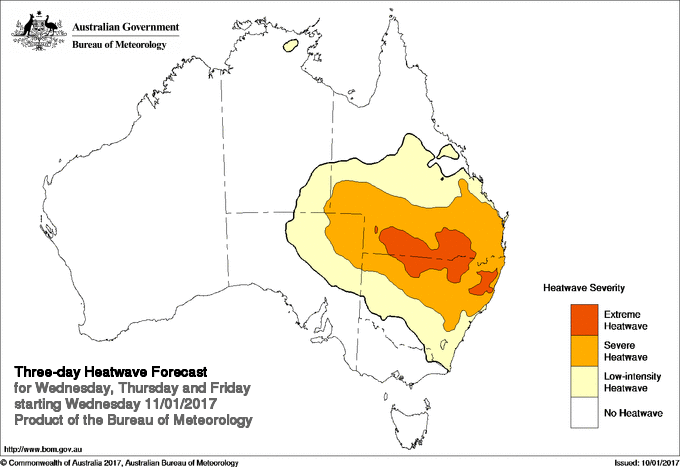A severe to extreme heatwave is forecast to hit the Tweed this week with temperatures soaring into the mid 30s in the Tweed Valley.
The Bureau of Meteorology has issued a Severe to Extreme Heatwave warning with forecast temperatures well above average.
The coast is forecast to avoid the heat with daytime temperatures remaining below 30 degrees.
| Wed. 11 Jan | Thu. 12 Jan | Fri. 13 Jan | Sat. 14 Jan | Sun. 15 Jan | |
| Summary | Possible late shower. | Possible shower. | Partly cloudy. | Possible shower. | Showers. Possible storm. |
| Max. Temperature | 35 C | 33 C | 33 C | 36 C | 32 C |
| Min. Temperature | 22 C | 22 C | 22 C | 22 C | 23 C |
Murwillumbah forecast. Source: Bureau of Meteorology
When temperatures are unusually hot over a period of time, with continuously high night-time and day-time temperatures, heat stress becomes a critical factor.
Hot weather can affect anybody, may make existing medical conditions worse and can cause heat-related illness. In some cases heat effects may be fatal. Heatwaves may also affect community infrastructure such as power supply and other support services.
The best way to reduce the risk of heat-related illness is to drink plenty of water and keep your body as cool as possible, and avoid prolonged sun exposure by staying indoors in cool or air-conditioned facilities-either at home or at local shopping centres, libraries and cinemas. If you are planning to stay indoors, you may want to ensure that your air conditioning system works perfectly fine.
Advice from NSW Health to prepare for a heatwave
It is a good idea to prepare for the heat before it arrives. As well as preparing on a personal level, you can prepare your house or apartment. You can, for example, install a weather station (click here to know more about a weather station) at home to monitor the duration and severity of the heatwave. Additionally, you will be able to know when the heat wave will end and the future weather forecast. During such difficult times, you may also need to help people living around you in need. Remember to have a chat with a neighbour or relative/close friend about keeping in contact during a heat wave in case you or they need any help. If need be, collecting necessary contacts including the HVAC servicemen (like the ones at Woolley Home Solutions, for example), electricians, and even neighbours can be a wise choice in this regard.
Personal
- Regularly check your local forecast from the Bureau of Meteorology on your radio, TV or on the internet.
- Get advice from your doctor about whether your medication and/or your medical conditions may affect what you should do if it gets extremely hot.
- If your doctor normally limits your fluids, check how much to drink in hot weather.
- Check that you can store your medication at less than 25 C (the medication can become less effective or occasionally toxic if stored at higher temperatures – check with your pharmacist if unsure).
- Make sure you know who you are going to call (who may need help and who could provide help to you if needed) – make a list of telephone numbers.
In your house or apartment
- Check your fridges, freezers, fans and air-conditioners to make sure they work properly.
- Contact a repair service immediately if you think that your appliances are not working efficiently. For instance, if your fridge is not cooling properly or your food is getting spoiled, you can contact a professional Viking refrigerator repair service in your close vicinity for appliance restoration and repair.
- Stock up on food (for your household and pets), water and medicines to last up to a week so you don’t have to go out in a heat wave.
- Consider buying cool packs to have in the fridge or freezer to help you cool down if needed.
- Put together a small emergency kit to plan for a possible power failure – this may include a torch, batteries, candles, matches, a battery operated radio and a first aid kit.
- Check that your home can be properly ventilated without compromising security.
- If need be, get in touch with a nearby HVAC company and ensure that the air conditioning system is working in its optimized state.
- If possible, have curtains with pale linings in rooms that get a lot of sunlight to help reflect the heat. Avoid dark reflective curtain linings and metal Venetian blinds as they absorb heat and may make rooms hotter.
- Consider putting external blinds, shutters or some other shading on windows in rooms which face west.
- Insulate your house – not only will this keep it cool in summer, but it will also keep it warm in winter.
- Create a cool room or cool area to go to during extreme heat. This room or area ideally should be east or south facing in the house and can be cooled using indoor and outdoor shading, ventilation and use of a fan or air-conditioning.
- Consider the risk of bushfires as they often occur on days of high temperature. Information on bushfire preparedness is available from the NSW Rural Fire Service.
For further information see the NSW Health website.
The Bureau of Meteorology is urging the public to stay tuned for the latest forecasts and warnings from the Bureau, and follow the advice of local emergency services.
